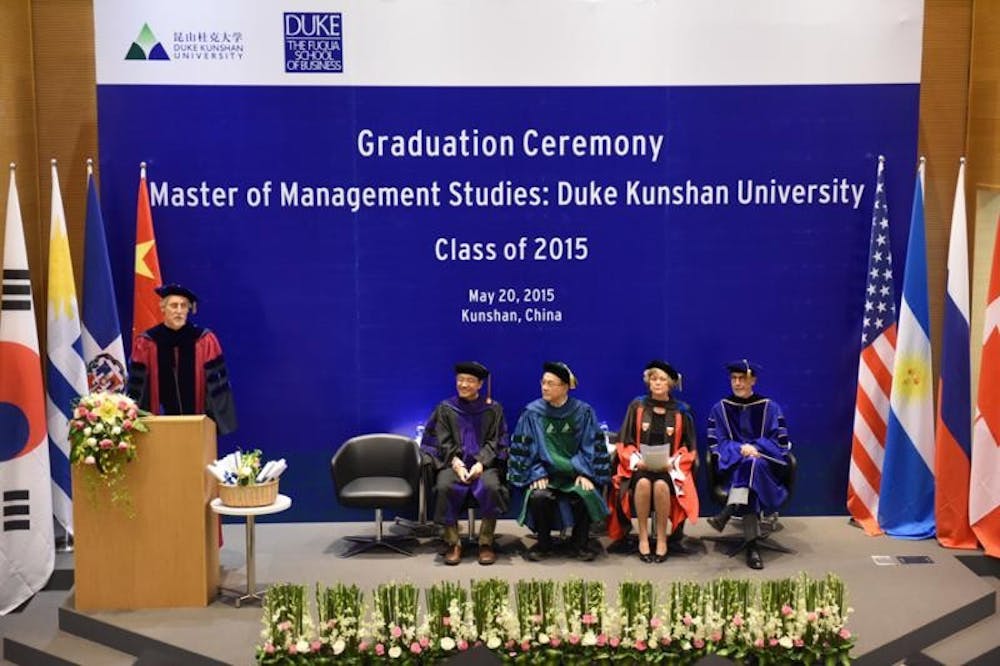After an inaugural year marked by changes in leadership and continuing construction, Duke Kunshan University celebrated its first-ever graduating class May 20.
The 32 students in the Master of Management Studies: Duke Kunshan University program, a degree hosted jointly by DKU and the Fuqua School of Business, became the first graduates from DKU. The students, who came from eight different countries, spent six months at Fuqua and four months at DKU.
“This is certainly a great milestone in the life of Duke University,” Bill Boulding, dean of Fuqua and J.B. Fuqua professor of business administration, wrote in an email. “These graduates have made history by being the first to complete this program, and…we are excited to see what the future holds for these graduates.”
Boulding noted that students enjoyed the split nature of the program, as it allowed them to gain insight into how business works on opposite sides of the world.
“It was a rewarding and exciting year,” Class President Shichao Weng said at the graduation ceremony. “The challenges and achievements bound us tightly with love and with the spirit of Team Fuqua.”
Many of the students will move on to jobs in both the U.S. and China, Boulding explained. They will be leaving behind a campus that prepares to enter its second year this Fall.
A finished campus?
Last Fall, The Chronicle reported on a campus that felt “unfinished” due to ongoing construction. At the time, student dormitories and a faculty residence hall were yet to be completed, and parts of the academic center were still under construction.
Since then, the dormitories and faculty housing have been completed. The academic center’s main cafeteria and auditorium have also opened, wrote James Dobbins, associate vice provost and director of the DKU Program Office, in an email. With the completion of these buildings, the second year’s iteration of the campus promises to be closer to an experience that the first year at times struggled to provide.
Despite the construction delays, Dobbins noted that the general responses from students and professors were very positive.
One of the strengths that was apparent from the start was the strong community formed by DKU students and faculty, said William Johnson, professor of classical studies. Johnson taught a course on Greek civilization at DKU and said he will return to teach again in Spring 2017.
“Your community isn’t made by the buildings around you, it’s made by the people around you,” Johnson said. “The emotional involvement between faculty and students was mirrored by an intense attachment among the students themselves. There was this enormously supportive, self-nurturing community. I’ve never seen anything like that.”
An issue that had many worried prior to the campus opening was the prospect of limitations on academic freedom. But those concerns may be unfounded—partly because the campus uses a virtual private network, bypassing the “Great Firewall” systems that the Chinese government uses to monitor and censor its citizens’ Internet use.
“When you’re on campus, it’s a safe zone and you can say what you think,” Johnson said. “Obviously when you get off campus—when you take field trips and so forth—you need to be a little more careful.”
Johnson noted that he suspected students from China would sometimes self-censor, possibly out of habit. Otherwise, censorship did not seem to pose any major problems.
“I didn’t feel that it altered anything that happened in the classroom, and it certainly didn’t affect my research in any respect,” Johnson said.
Future growth
Although the first year was generally a success, there is still much work to be done before DKU can put its turbulent beginnings behind it.
Currently, DKU hosts a semester-long undergraduate program and a collection of master’s programs. But the ultimate goal is to transform DKU into a full four-year university. With the logistical questions mostly settled after the first year, administrators and faculty are free to focus on creating the curriculum that will eventually become the foundation of the school’s academic offerings.
“One of our priorities is to enhance DKU’s curriculum in response to student and faculty interest,” Dobbins wrote. “Particularly in the undergraduate program we’re continuing to build the course offerings for future semesters, and we were able to learn more about the types of courses that are most in demand by DKU’s international student body.”
Get The Chronicle straight to your inbox
Sign up for our weekly newsletter. Cancel at any time.
Along with curricular matters, expanding the research program will be another priority. A special focus will be placed on collaboration with scholars from partner school Wuhan University and other institutions, Dobbins explained.
In the more immediate future, DKU will search for a new executive vice chancellor to replace outgoing executive vice chancellor Mary Brown Bullock. The search committee will be headed by Randall Kramer, professor of environmental economics and global health and deputy director of the Duke Global Health Institute.
This is the school’s second major administrative change in 2015, as Dobbins replaced Nora Bynum, former vice provost for DKU and China initiatives, in February.
“We have strong leadership teams in place in Durham and Kunshan, and are working to ensure a smooth transition when Mary Bullock retires this summer,” Dobbins wrote.

